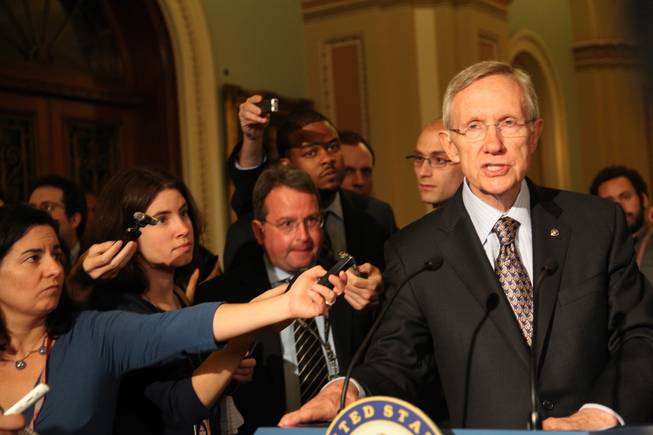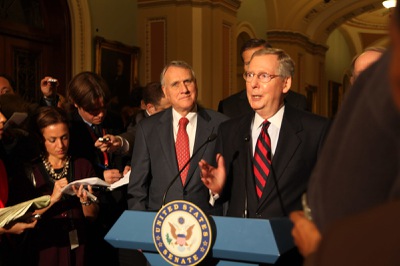
Senate Majority Leader Harry Reid said Tuesday it is his “constitutional responsibility” to secure earmarks for the people of Nevada.
Wednesday, Nov. 17, 2010 | 2 a.m.
Sun archives
- Senate Democrats swim against anti-earmark tide (11-17-2010)
- Top Senate Republican joins push to stop earmarks (11-15-2010)
- Heller says he won’t seek federal money for Nevada special projects (11-9-2010)
- Anti-earmarks sentiment grows among Republicans (11-15-2010)
- Reid is one of Senate’s top earmark recipients with more than a quarter-billion dollars, group finds (2-18-2010)
At budget-drafting time, Democrats and Republicans are usually clamoring over one another to claim the discretionary dollars that go toward earmark — also known as “pork barrel” — spending. Now, they’re tripping over each other to denounce the practice.
A handful of Senate Democrats have broken away from their leaders to join with Republicans calling for a ban on earmarks for the next three fiscal cycles — and pledging to force Congress to vote on such a ban, possibly as early as today.
The push from both sides is putting Senate Majority Leader Harry Reid of Nevada — a staunch supporter of earmarks — in an increasingly tight spot as he tries to preserve his power to deliver the dollars to his economically stricken state.
But earmarks, even for meritorious home state projects, have became unpopular given the poor economy and the huge budget deficit.
On Tuesday, conservative Democrats Claire McCaskill of Missouri and Mark Udall of Colorado joined with staunch conservative Republicans Tom Coburn of Oklahoma and John McCain of Arizona — who ran much of his presidential campaign on an anti-earmark platform — to call for an all-out ban on earmarks.
“There is some real nutty stuff that has traditionally been done around here that makes no sense whatsoever,” McCaskill said. “The system gets paralyzed because we’ve got to do a certain kind of bidding so that we get our earmarks from the appropriators — it gives them an enormous amount of power.”
McCaskill, who was elected in 2006 and is one of the 23 Democrats coming up for re-election in 2012, has not actually requested an earmark during her entire tenure as a U.S. senator. That can’t be said for all supporters of the ban — such as Nevada’s own John Ensign, who lent his name to 27 earmarks in fiscal 2010 alone.
But the cue for earmark reform isn’t just coming from the more conservative factions of the parties — it appears to have at least nominal support going all the way to the White House. In his weekly radio address on Saturday, President Barack Obama signaled to lawmakers that he was ready to parley on earmark reform, trumpeting his own record as an advocate for transparency and restraint, and calling on lawmakers to consider a revamped policy on earmarks as a means of restoring public trust.
But not everybody sees it that way.
“I believe, personally, we have a constitutional obligation and responsibility to do congressional earmarking,” Reid told reporters Tuesday. “I think I have an obligation to the people of Nevada to do what’s important to Nevada and not what’s important to some bureaucrat with green eyeshades … I think it would be a tremendous step backward.”
Reid — who sponsored 168 earmarks in fiscal 2010 — ran a successful re-election campaign this midterm cycle largely on his record of having brought home the bacon to Nevada for local projects.
Nevada ranks ninth in the nation for earmark spending, with $79.07 in spending per capita, according to the advocacy group Taxpayers for Common Sense.
Of course that’s still relative — Nos. 1 through 8 all pull in more than $100 per person in earmarks, and appropriations committee Chairman Daniel Inouye’s native Hawaii got a chart-topping $318.26 per person in fiscal 2010.
But lawmakers who support the continued availability of earmark spending say the projects are what counts.
“For a little state like Nevada, an earmark ban, while it may sound good, would be a disaster,” said Rep. Shelley Berkley, who sponsored 34 earmarks in fiscal 2010.
Nevada has benefitted from earmarks in projects ranging from transportation to medical care. Earmarks have gone to support expansions of I-80, I-15 and Boulder Highway, preventive anti-flooding development in the Las Vegas Wash, and in 2008, the country’s single largest earmark — almost $350 million — went to fund construction of the Southern Nevada Veterans Hospital. Those sorts of projects have also helped to create thousands of jobs, Reid staffers say.
There are some state projects, of course, which seem less crucial — like the total of $3.5 million requested from 2008 to 2009 for construction of a state-of-the-art Interpretive Center on the California Trail outside the small northeastern city of Elko, to be run by the Bureau of Land Management.
Some Nevadans think it’s time for all spending to stop. Republican Rep. Dean Heller, who represents Nevada’s 2nd Congressional District and supports the ban, acknowledges he has requested earmarks — 21 in fiscal 2010 — but says the fiscal climate means it’s time to stop.
Not all Republicans agree with him. Longtime GOP Sens. Richard Lugar of Indiana and James Inhofe of Oklahoma have spoken out against their party’s earmark-stopping initiatives, saying that to cut off Congress’ ability to do earmarking would hand over too much budget-making authority to the Obama administration — and wouldn’t really save any money in the long run.
But in the GOP, they’re becoming the minority. Anti-earmarking has been a big sell among the newly elected Tea Party candidates, who campaigned on a platform of reducing spending in Washington — and the momentum seems to have turned party leaders such as Mitch McConnell, who was speaking against an earmark ban two short weeks ago — but is now pressing Reid to allow a vote.
Republicans may attempt to force a vote by introducing an earmark ban as an amendment to a bill on the Senate calendar — such as food safety legislation, which the chamber is supposed to start debating today.
GOP caucuses in the House and Senate adopted resolutions Tuesday for a moratorium on earmarks. But the bipartisan group of anti-earmark crusaders isn’t numerous enough to carry a full ban on earmarks through, by their own admission.
“Counting the numbers right now, I would be surprised if we got more than two” Democrats to vote for a ban, McCaskill said Tuesday. “I think it’s going to depend on how far the Republican caucus is going to go to force a vote on it.”


Join the Discussion:
Check this out for a full explanation of our conversion to the LiveFyre commenting system and instructions on how to sign up for an account.
Full comments policy